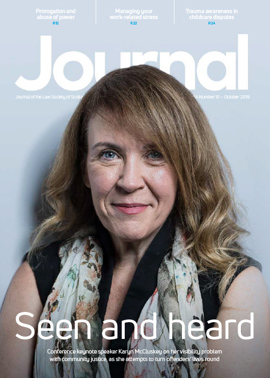Let's talk about suicide

This year’s World Mental Health Day (10 October) focused on suicide prevention. While only a handful of callers to the LawCare helpline have been suicidal, we know of many sad cases of legal professionals who have taken their own life, such as Gabe MacConaill at Sidney Austin in the US last year and others closer to home. It is something we listen out for in every call, email or webchat.
Masculine traits
Suicide is the biggest killer of men under 45. Men in the UK are statistically three times more likely to die by suicide than women, with men aged 45-49 showing the highest number of suicides in 2018.
Men are more likely to try to deal with their problems alone, hiding what’s happening and not asking for help. Men can also find it harder to put their feelings into words. This leads to greater isolation. These factors can increase the risk of suicide, and can be compounded by long hours and limited time for social connections.
Talking helps
Whilst death by suicide can occur because of severe psychological illness, acute psychological stress, or predisposing temperament and genetic vulnerabilities, suicide can happen to anyone – and often news of a colleague or friend taking their own life is a complete shock to those around them.
Suicide remains something of a taboo. We need to encourage a more open culture in the law, where people talk about their feelings and ask for help. If you are worried about someone, you should always attempt to talk to them.
It is absolutely not the case that asking about suicide precipitates the action. Rather it shows the person you genuinely care and want to help.
Signs to look out for
These are not exhaustive, and some people will show no significant signs:
- changes in behaviour e.g. mood swings, sleeping/eating patterns, becoming angry, negative, depressed;
- out-of-character reckless behaviour, e.g. giving away all possessions, increased use of drugs or alcohol, excessive spending;
- neglecting grooming and personal hygiene;
- suddenly appearing very calm or relieved after a period of depression;
- settling affairs and saying goodbye;
- talking about suicide or dying.
How to have the conversation
- Ask: Have you thought about suicide? Be direct. Use simple, direct questions in a non-judgmental, non-confrontational way.
- Listen to the response.
- Keep talking to the person.
- Ask if you can assist them to access help and support by calling a family member, the emergency services, a helpline or their GP.
- If you believe there is an immediate risk, do not leave the person alone if you are in the same room, but be mindful of your own safety.
- If talking to them on the phone, use another phone to let the police know.
If you have thought of suicide
- Talk to someone: a friend, your GP, a helpline.
- Be around other people.
- Go to a safe place such as a friend’s house, a Samaritans drop-in centre.
- Try not to think about the future – just focus on getting through today.
- Remember drugs and alcohol are not a solution, and may make you feel worse.
- Do something you usually enjoy.
Useful resources
Call LawCare’s free, independent, confidential helpline on 0800 279 6888 for immediate support, or visit www.lawcare.org.uk to access webchat, email support and useful factsheets and information. You can also contact us if you are worried about a colleague and are unsure how to support them.
Samaritans – for everyone: call 116 123.
Campaign Against Living Miserably (CALM) – for men: call 0800 58 58 58, 5pm to midnight every day; www.thecalmzone.net/
Papyrus – for people under 35: call 0800 068 41 41; www.papyrus-uk.org
Survivors of Bereavement by Suicide – call 0300 111 5065.
Suicide Bereaved Network – call 0300 999 0003.
Regulars
Features
Briefings
- Law fair for the high street
- It's time for home truths
- No hope at age 16?
- Drug driving
- Licensing and the public health objective
- Constructing the new framework
- Scottish Solicitors' Disipline Tribunal
- Calling-up: the questions continue
- Reverse charge: don't sit back
- The anomaly that is immigration bail







